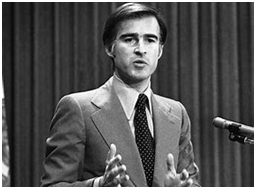
“A Piece of My Mind”
February 2019 Newsletter
Advancing Christian Faith and Values,
Defending Religious Liberty for All,
Supporting Civility and the Common Good
through Preaching, Teaching, Writing, Activism and Reasoned Conversations

I was so fascinated by the total lunar eclipse on January 20 that I sat in the yard and watched it all. Many thoughts, songs and scriptures came to mind as I watched, such as these words from Psalm 8 –
 O Lord, our Lord,
O Lord, our Lord,
how majestic is your name in all the earth!
When I look at your heavens, the work of your fingers,
the moon and the stars, which you have set in place,
what is man that you are mindful of him,
and the son of man that you care for him?
Yet you have made him a little lower
than the heavenly beings
and crowned him with glory and honor.
Roe v. Wade at 46 – The Great Divide
The watershed abortion case “Roe v. Wade” was decided 46 years ago, on January 22, 1973. Two facts for sure: (1) it remains “the law of the land” on abortion and (2) it is as controversial as ever.
Later court decisions have clarified “Roe” (whether the government can refuse to pay for abortions, “notification” rules, “waiting periods”, protest-free zones around abortion clinics, etc.) but its core decision stands. Nominees for court positions are scrutinized on whether they will accept “Roe” as settled law (“stare decisis”—deference to past decisions—is the expectation, but who would support this in the case of “Dred Scott”?).
Who was “Roe”?
 (Pictured with feminist attorney Gloria Allred)
(Pictured with feminist attorney Gloria Allred)
This anonymous litigant sought to have an abortion, which was forbidden under Texas law at the time. Her real name was Norma McCorvey. Long before “Roe v. Wade” was decided she gave birth and gave the baby for adoption.
McCorvey converted to Christianity in 1995 and was baptized. She quit her job at an abortion clinic and became a pro-life activist, vowing to spend the rest of her life fighting the decision that bore her name. She joined the Roman Catholic Church in 1998. She passed away in 2017 at age 69.
What did “Roe v. Wade” determine?
The decision overturned all laws in America that restricted abortion.
The court explicitly denied that abortion was an absolute right. Rather, it was a “qualified” right. The court found a “right to privacy” in the “penumbra” of the constitution, namely in the “Due Process Clause” of the Fourteenth Amendment, as the basis for this qualified right.
The court attempted to balance its finding on a pregnant woman’s right to abortion with “the potentiality of human life” by creating a system of “trimesters”. But how well did it succeed with this balance?
For the first trimester, months one through three of the pregnancy, the decision for abortion is a matter (as is commonly stated) “between the woman and her physician”—essentially “abortion on demand.”
For the second trimester, months four through six, the states may regulate abortion procedures in the interest of the woman’s health.
During the third trimester, months seven through nine, the court allowed states to regulate or even ban abortion due to the “potentiality of human life” except when necessary to protect the life or health of the mother. “Health” is a very elastic term. A companion decision, “Doe v. Bolton”, determined that physical, emotional, psychological, and familial factors all relate to “health”.
In dissent, Justice Rehnquist argued that the “trimester” system was created by judicial legislation and the “right to privacy” was not to be found in the Fourteenth Amendment, being completely unknown to those who drafted it.
 After “Roe v Wade”
After “Roe v Wade”
“Roe v. Wade” didn’t really settle anything. Not in law. Certainly not in societal opinion or in social activism.
SOME GENERALIZATIONS:
Americans support abortion rights during the first trimester. Americans oppose abortion rights in the second and third trimester. Americans support abortion rights for those “tough cases” of rape, incest or threat to a mother’s life or serious threat to her health. Americans oppose abortion rights for choosing the sex of the child, for financial reasons, or “abortion on demand.” Americans widely support regulations on abortion, such as parental notification. These are generalizations and show a more restrictive view than “Roe” and certainly more restrictive than the view held by abortion rights activists. They are more lenient than views of “right to life” activists.
Abortion is a “litmus test” issue for politicians and judicial nominees. It is a feature of America’s “cultural divide.” The debate isn’t going away.
In other newsletters I will discuss how the Bible speaks to this issue.
First Amendment Vigilance –
 “Those who expect to reap the blessings of freedom must…undergo the fatigue of supporting it.” – Thomas Paine
“Those who expect to reap the blessings of freedom must…undergo the fatigue of supporting it.” – Thomas Paine
The “Not Good for Nonprofits Tax”
“At stake is a provision in the $1.5 trillion Tax Cuts and Jobs Act of 2017 that directed not-for-profits of all kinds — houses of worship but also, for example, universities, museums and orchestras — to pay a 21 percent tax on certain fringe benefits for their employees, such as parking and meals.” (Washington Post, Dec. 6, 2018)
Quite hidden in this new law is a very controversial provision. Non-profit organizations, including churches, will need to pay a 21% tax on employee benefits such as parking. This means that many churches will be required, for the very first time, to file a federal income tax return and perhaps also a state return—and pay taxes to both.
“This tax brings unnecessary complexity and cost to nonprofits serving charitable purposes. For this reason, ECFA continues to call upon Congress to repeal the nonprofit parking tax altogether.” – Evangelical Council for Financial Accountability
The National Association of Evangelicals is also alarmed. However there is this word of caution from Church Law & Tax Report: “While there are differing opinions on the matter, we believe many churches are not affected by this provision when it comes to the parking they provide to employees.”
Bottom line, this is a matter for watchful concern. Be prepared to contact your representative in Congress and ask for repeal of this provision.
 Bible Insight –
Bible Insight –
The Power of Words
I gave the opening prayer at my church at our service on January 13. As I often do, I pray for secular leaders (1 Timothy 2:1-2). That morning I prayed, “Forgive them for the acrimony and incivility we are seeing all too often.” It is shameful.
As children we may have said to one taunting us, “Sticks and stones may break my bones, but words will never hurt me.” We knew then and know now that this just isn’t so. Word can benefit us immensely or can hurt us greatly.
“The words of the reckless pierce like swords,
but the tongue of the wise brings healing.” (Proverbs 12:18)
To learn about the good and bad of words, go to the Book of Proverbs.
What is the Book of Proverbs? It’s a collection of moral principles on many common issues that help us navigate ethically and honorably in a difficult, sometimes unfair world. Even more, I believe it is a collection God endorses and wants us to know to be wise. One of the key themes of Proverbs is speech—what’s good and not so good. What do we say that either brings help, healing and integrity to a situation or brings bitterness, strife and injustice?
Here are some of the speech counsels we get from Proverbs. After each statement, I give the chapter and verse in Proverbs where you can find it.
Gossip and Slander
A perverse person stirs up conflict,
and a gossip separates close friends. (16:28)
A gossip betrays a confidence,
but a trustworthy person keeps a secret. (11:13)
Whoever conceals hatred with lying lips
and spreads slander is a fool. (10:18)
Contentious Words that stir up trouble
As charcoal to embers and as wood to fire,
so is a quarrelsome person for kindling strife. (26:21)
Starting a quarrel is like breaching a dam;
so drop the matter before a dispute breaks out. (17:14)
Truth and Lies
The Lord detests lying lips,
but he delights in people who are trustworthy. (12:22)
A fortune made by a lying tongue
is a fleeting vapor and a deadly snare. (21:6)
Too Much Talking, Period!
When words are many, sin is not absent
But he who holds his tongue is wise. (10:19)
Do you see someone who speaks in haste?
There is more hope for a fool than for him. (29:20)
Those who guard their mouths and their tongues
keep themselves from calamity. (21:23)
The one who has knowledge uses words with restraint,
and whoever has understanding is even-tempered. (17:27)
Gracious and gentle words
Gracious words are a honeycomb,
sweet to the soul and healing to the bones. (16:24)
A gentle answer turns away wrath,
but a harsh word stirs up anger. (15:1)
The Bible says our tongues, though small among our bodies’ members, are the hardest part of the body to control (James 3:1-12). With our tongues we bless God one moment and the next moment turn around and curse our neighbor. With encouragement, prayer, self-discipline, Bible reading and God’s grace and power, let’s learn to control the tongue more and more.
The prayer we should pray (Psalm 19:14):
Let the words of my mouth and the meditation of my heart
be acceptable in your sight, O Lord, my rock and my redeemer.
 Recommended Reading:
Recommended Reading:
The Point of It All
by Charles Krauthammer (2018)
This book brings together the choicest of Charles Krauthammer’s writings over four decades. It was a collaborative effort between him and his son Daniel during the last year of Charles’ life. Most sections are just three pages long—the standard number of words for an opinion column in The Washington Post or elsewhere.
One appetizer from “Three Pieces of Sage Advice”, an address to McGill University’s Class of 1993:
“We live in an age in which the highest moral injunction is to get in touch with one’s feelings. Speaking as a psychiatrist—well, a psychiatrist in remission— I can assure you that this is a highly overrated pursuit.
“The reigning cliché of the day is that in order to love others one must first learn to love oneself. This formulation—love thyself, then thy neighbor—is a license for unremitting self-indulgence, because the quest for self-love is endless…
“’Love thy neighbor’ was supposed to be the hard part of the biblical injunction. Sometimes it seems as if all of America is working on the ‘thyself’ part—almost a definition of narcissism.”
Quotes from 4-term Governor Jerry Brown as he finished his final term
 Terms 1 and 2 (1975-1983)
Terms 1 and 2 (1975-1983)
“Constituencies want more money and more laws. I take a different view.”
“We have too many damn laws. The coercive power of the state should be invoked sparingly. They tell me almost all of the bills that I have vetoed have been reintroduced.”
 “You know what a governor is on an engine?
“You know what a governor is on an engine?
The governor prevents the engine from getting out of control. Well, that is what the governor has to do in state government.”
“The more money you have, the better you feel. The better you feel, the more you spend. But at that very moment, you should have stopped.”
Terms 3 and 4 (2011-2019)
 Don’s Upcoming Ministries
Don’s Upcoming Ministries
February 28, 2019 – Speak on “Evangelicalism” as part of the “Religion 101” series sponsored by the South Coast Interfaith Council (7:00 p.m. at the LDS Institute of Religion, 6360 E. State University Drive in Long Beach).
April 14, 2019 – Speak in morning worship services at Grace Community Church of Seal Beach.
My Website: www.donaldshoemakerministries.com
Contact me at: donaldshoemakerministries@verizon.net

